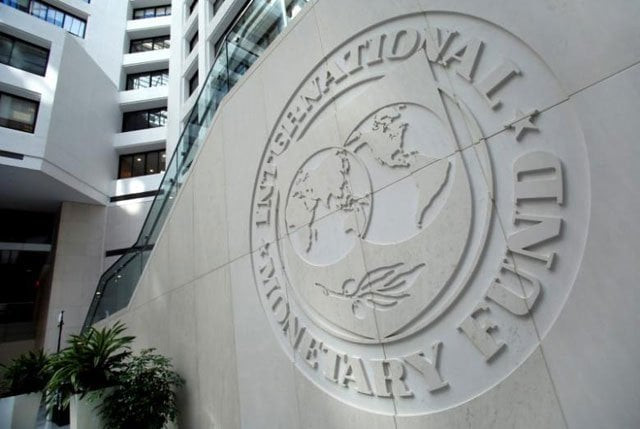Balance of payments worsens: Pakistan could knock at IMF’s doors in April
Discussions likely to begin during World Bank-IMF spring meetings in Washington next month

Discussions likely to begin during World Bank-IMF spring meetings in Washington next month. PHOTO: REUTERS
Notwithstanding Adviser on Finance Miftah Ismail’s statement that the government is not seeking any IMF assistance, the Washington-based lender is said to have been obliged to steer through highly difficult 2017-18 and 2018-19 financial years.
The government is expected to take up the issue of new IMF financing in April during World Bank-IMF spring meetings in Washington.
Ismail does not see any further downward readjustment of the currency in the near future. However, those who are in the know of things, both in the central bank and the Ministry of Finance, maintain that lobbyists at home and abroad are working to persuade the authorities to go for another depreciation before June.
Is there a balance of payments crisis in the making?
Insiders described it as a ‘panic situation’ in the Ministry of Finance and the word ‘bottom line’ is being used for seeking an emergency $6-7 billion in IMF assistance to make timely repayments and tackle the looming balance of payments crisis.
In the absence of any credible economic team, two officials – Talib Balouch and Khaqan Najeeb - are considered ‘opening batsmen’ of the finance ministry to take important decisions.
One is calling for seeking IMF assistance to ward off the impending balance of payments crisis while the other is suggesting acquiring commercial loans continuously at high mark-up. Since the World Bank and the Asian Development Bank (ADB) have linked their annual assistance to the IMF’s signal, seeking commercial loans, particularly from China and Chinese commercial banks, are seen a viable option to manage external inflows. A total of $1.3 billion in commercial borrowing had been obtained in the last few months which also included $900 million in just one quarter. There is no strategy how to deal with the intensifying balance of payments crisis.
Economic mess
Successive secretaries of the Ministry of Finance and governors of the central bank are being held responsible for having created the current economic mess due to which the fiscal and current account deficits have increased disproportionately causing new difficulties for the country.
Since December last year, the government has let the rupee weaken by about 10% that has multiplied the country’s external debt. What if the IMF dictates are accepted to push the currency down by another 13% as has been demanded in every meeting with the Pakistani officials?
Uncertainty and gloom over the economic situation have grown following the release of post-programme monitoring report by the IMF that believes that risks to macroeconomic stability are increasing and that widening fiscal and external deficits could land Pakistan into new trouble. The timing of the report has been termed intriguing by independent economists as it eroded investors’ confidence. They say IMF officials were ‘partners in crime’ as they had been waiving things by giving a clean bill of health to the Pakistani economy during the three-year $6.67 billion Extended Fund Facility that ended in September 2016.
The report was unprecedented in terms of pointing out serious risks that IMF officials believe surfaced after the completion of the programme. In fact, they are suggesting that as long as the IMF programme continued nothing happened and the country’s economy started collapsing when there was no oversight available by them.
Who does not know that the country is witnessing multi-dimensional economic challenges, the foremost of which is how to prevent insolvency that is coming in the wake of worsening balance of payments problem?
Balance of payments: Evolution of policymaking to control budget deficit
The present government will complete its five-year term by early June this year and by that time external debt and liabilities would have crossed $100 billion that also includes the $2.5 billion added by the latest depreciation of the rupee.
The gross failure in increasing exports and home remittances coupled with foreign direct investment (FDI) and portfolio investment and other non-debt creating inflows have caused serious balance of payments problem.
Strict stabilisation policy
Now, it appears that everything revolves around IMF assistance or acquiring more and more commercial loans from China. But Chinese authorities may not be that forthcoming and eventually this or the caretaker government will have to knock the doors of the IMF to help rescue the economy.
This time around, Pakistan will be forced to go for a strict stabilisation policy in the name of austerity. But there is a growing consensus that so-called stabilisation has caused problems to the economy’s growth.
IMF officials, it is said, are more concerned about getting back their $6.6 billion and in case they decide to honour yet another funding request, they will pressurise the government to implement taxation and energy-related reforms besides cutting development budget to restrict fiscal deficit. The deficit, officials concede, will go as high as 7% while others believe it might end up at 8% considering the huge resources being doled out to PML-N legislators to win elections.
Fiscal deficit, which is considered the mother of all economic ills, continues to widen as the gap between income and expenditure has grown over Rs2 trillion. How could the FBR deal with this issue without reforming its system is anybody’s guess?
The government plans to have its revenue collection target fixed at Rs4.5 trillion in 2018-19. Is it achievable considering the usual shortfall of Rs200 to Rs250 billion seen every year for the last many years?
Root cause of fiscal problem
The seventh National Finance Commission (NFC) award that gave 57.5% share to provinces is now becoming the root cause of the fiscal problem. Things further aggravated due to the 18th Constitution Amendment which empowered provinces without enhancing their capacity and wisdom to spend resources.
Need to study medium-term effects of rupee devaluation
Those two things have, in fact, emptied the federal treasury. For the current fiscal year, the federal government under the National Finance Commission (NFC) Award is extending Rs2.4 trillion to the provinces and retaining just Rs1.6 trillion to manage its responsibilities.
Without addressing the NFC issue, fiscal problems will continue to swell and in the absence of a certain strategy, the current account deficit can’t be reduced which is widening due to unparalleled imports and declining exports.
The caretaker government and the new elected government will have a gigantic task to address the issue of twin deficits. The manipulated figures would not do the trick to tackle serious challenges.
Ironically, when major economic indicators including imports and exports, fiscal and external deficits, revenues and FDI are deteriorating, the government is showing 14% industrial growth.
From where is this growth coming? The sad part of the problem is nobody is taking the economy seriously.
The writer is the recipient of four national APNS awards and four international awards for journalism
Published in The Express Tribune, March 26th, 2018.
Like Business on Facebook, follow @TribuneBiz on Twitter to stay informed and join in the conversation.



















COMMENTS
Comments are moderated and generally will be posted if they are on-topic and not abusive.
For more information, please see our Comments FAQ